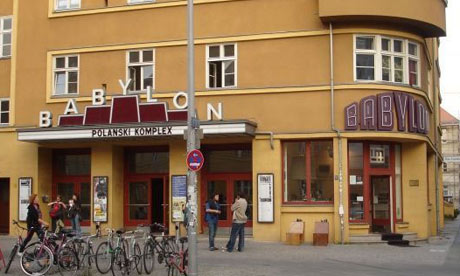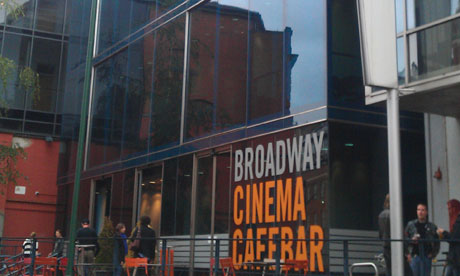On location: Opposite the Volksbuhne theatre, in the heart of former East Berlin. Round the corner from the former Communist party HQ, now turned into Soho House Berlin. Nearest U-Bahn is Rosa-Luxemurg Platz (you get the picture ...).
Name: Babylon (but universally known as the Babylon Mitte, to distinguish it from the Babylon cinema in Kreuzberg).
Email: Doesn't appear to be one (this is too-cool-for-skool Berlin, after all).
Crowd scene: Not just the usual skinny-jeaned hipsters (although there are plenty of those, too), but the Babylon's highbrow programming attracts bonafide buffs, middle-aged couples, students, and – this being central Berlin and most of the output being in English or with English subtitles – plenty of tourists, too. Being one of the host venues of the annual Berlinale film festival each February means that the posteriors of Gerard Depardieu, Jeff Goldblum and the like have also graced the Babylon.
Back story: Not 'arf. Built in 1929 by architect Hans Poelzig (whose Schauspielhaus, demolished in the 1980s, boasted a "stalagtite" style thought to have influenced the set design for David Lynch's Dune). Under the Nazis, Communist party projectionist Rudolf Lunau hid resistance fighters in his projection room – a plaque commemorating him, that was put up by the DDR in the 1980s, now adorns the foyer.
The building survived the war, and was a favourite cinema under the communist regime, showing (relatively) daring fare. After the fall of the Wall, closed in 1993 due to a collapsing ceiling, and was restored in 2001. The foyer is a delightful art deco affair, painted in red and yellow with many original fittings – not least the (now sadly disused) twin ticket office cubicles, with ornate "Wait Here" railings.
Show business: Justly famous for superb and comprehensive retrospectives, mixed with the cutting edge of new-release documentaries, plus a smattering of contemporary releases and repertory German classics. Currently a deeply academic Charlie Chaplin retrospective follows hot on the heels of another look back at Hitchcock – familiar names, but given the full works, with talks, shorts and docs.
Another string takes in contemporary documentaries, such as Senna, and also regular French, Italian and Spanish cinema seasons, as well as new German arthouse releases.
In other words, it won't be showing Kung Fu Panda 2.
Parental guidance: Both sorts – films for kids (and not just the latest Disney fare, but classics from the 1960s) are Sundays at 2.30pm, while "mother and baby" screenings are Wednesday mornings.
Senior service: Doesn't appear to be specific "grey" screenings – but with the amount of repertory fodder from the golden age (1920s-1960s) screened week-in, week-out, there's bound to be something to satisfy the senior citizen.
Tickets: 6.5 euros, or 3 euros if you become a "friend of the Babylon". Films over 130 minutes are 7 euros, films over 150 minutes 7.5 euros (a common hike among Berlin cinemas). Children 4 euros, with 10 children or more receiving a group discount price of 2.5 euros each.
Camera fodder: Haribos (cult German sweeties) 1.50 euros a bag, Brezel (a German pretzel) 1.50 euros. No cake.
Medium popcorn and soft drink: Popcorn not available. Bionade, the Berlin-cool equivalent of cola, 2 euros.
Hot drinks: Coffee 1.50, ditto herbal/hypochondriac (this is Germany) teas. But nothing special.
Alcohol: Glass of merlot 3.50 euros, beer 2.50 euros for 0.3 litres, 3.50 euros for 0.5litres.
Auditorium: Fabulous single-screen auditorium, restored in greys and yellows to contrast with the red and yellow foyer. A thick, heavy-draped curtain, as it should be. Downstairs there are 421 seats, extremely comfortable, with capacious legroom and (intermittent) armrest tables. Drink holders on back of seat in front. An upstairs balcony probably holds another 100-plus but is rarely in use outside Berlinale time.
The pride of the place, though, is the restored cinema organ, dating from 1929, and restored in the 1990s, with 100 stops and 913 pipes. Check website for screenings with organ accompaniment.
Appear to be two private boxes which are now sadly not in use.
Projection: A controversial topic. Berliners are complaining more and more "film" is a DVD projection. The cinema owners say they are reduced to projecting digitally when obscure, or old, or prints with German subtitles are not otherwise available. Still mostly 35mm, checked and professionally focused, with an announcement if using digital. The ad reel of Turkish mothers BBQ-ing in the park to advertise Berliner Morgenpost seems to have been around for ever, and usually attracts derisory laughs.
Disabled access: Via a side entrance down the right-hand side of the building, and a ramp which takes you straight into the foyer. No disabled access for Kino 3, which is up two very steep flights of steps. Kino 2 has flat access off the street.
Disabled loos: On the ground floor, no special key required.
Events: Regularly holds literature evenings and readings, as well as the occasional indie gig. Not to mention being turned over as a key Berlinale film festival venue for two weeks every February (although bring a serious overcoat if coming – Berlin in February is regularly minus 15 degrees and knee-deep in snow).
Toilets: Women's (D for Damen) downstairs, Men's (H for Herren) on the first floor. Cramped, but nicely curved walls which fit into the overall art deco layout of the building.
Facilities: Wouldn't hurt to have a few more seats in the foyer/bar area. Outside, the "wings" of the building have been rented out to an upmarket cafe (which, annoyingly, isn't always open late in the evenings) and a DJ record shop (this is Berlin, after all.)
Staff: Sore point. Recently reduced, and now selling tickets from behind the bar in the foyer, rather than the original kiosks in the entrance. Often seems understaffed (barely the barman and a ticket collector) and repeated reports of attempted strikes by staff. Seem friendly enough, considering. Universally speak (enough) English.
Pros: Absolutely first-class programming, in a historic, atmospheric showpiece of the Berlin cinema scene, whose own history is almost worthy of a movie itself. Alongside the Kino International (one for another time), one of the Berlin cinemas worth a visit in its own right.
Cons: Not always clear in which auditorium which film is going to be screened, nor always stated whether will have subtitles, dubbed or original version (although the staff on the door will know).
Top tips: If your film's screening in Kino 3, make sure it's something you really want to see, or can't view elsewhere, as it's basically a cramped attic (think Odeon on Panton Street). Gorgeous as the foyer is, it can be a little echoey and bare for a post-film drink – try the Alt Berlin bar round the corner on Munzstrasse, an old grungy Berlin kneipe.











